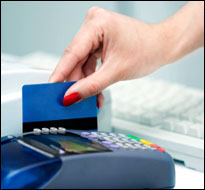Credit card debt in the United States rose by $17.1 billion in May 2012, suggesting that many Americans are still struggling to make ends meet as the economy’s “jobless recovery” continues. A 2011 study, “Leave Home Without It? The Effects of Credit Card Debt and Available Credit on Spending” (PDF), noted that many of those who defaulted on their credit card debts during the recession had solid credit histories. How do these responsible consumers unaccustomed to significant debt deal with rising credit card balances and declining credit lines?
That study, published in the Journal of Marketing Research, analyzed the results of four experiments and an online survey to better understand the effects of both credit card debt and available credit balance on the spending practices of consumers with relatively high self-control. Traditional economic theory suggests that an individual’s level of self-control is maintained regardless of circumstances, but behavioral studies have shown that people tend to abandon a goal after an initial failure — for instance, a smoker trying to quit, smokes one cigarette and then abandons his goal altogether.
Key study findings include:
- “For people with high self-control, carrying a credit card balance leads to greater spending than no balance.” The researchers suggest that this finding complements existing behavioral research on early frustrations that derail goal attainment.
- The amount of available credit has no impact on spending habits. “Available credit moderates the effects of an incurred balance on spending, so that increases in the available credit reduce the psychological impact of the balance and eliminate greater spending for people with high self-control.”
- The amount of available credit does influence the emotional responses of those with higher levels of self-control. When the available credit was less than $1,000, these individuals experienced more negative emotions, but when available credit was more than $10,000 there was no emotional impact. “Increasing available credit reduces the psychological pain associated with incurring the balance or those with high self control.”
- “The relationship between self-control and the likelihood of incurring a balance is relatively small … implying that people with high self-control may not be effective at avoiding unwanted behaviors in the financial budgeting domain.”
The researchers concluded that “the same mechanism that leads those with high self-control to be more effective at controlling their spending before incurring a balance (i.e., debt avoidance) also makes them prone to suspend control after incurring a balance.” They suggest that this tendency to relax fiscal constraints in the face of a setback can be addressed by focusing more closely on the goal-setting process, mitigating feelings of failure, and better understanding consumers’ perceptions of wealth.
Tags: consumer affairs, economy


Expert Commentary